This is the transcript for my podcast. If you would rather drive than read this on the site, then you can click here to play it in the browser. Reading your phone while driving is just terrible. Don't be that person. To subscribe on iTunes, click here. Have feedback? Corrections? Suggestions for future shows? Let me know on twitter.
The Debt is Paid
This week on the myths and legends podcat, we finish the bloody, grim Viking legend of the saga of the Volsungs and things definitely get worse before they do not get better for the cursed family, and the Saga of the Volsungs ends not with a bang, but with several stabbings. In the creature of the week segment, you'll see how to tell if your simple, humble house cat is the Scottish King of the Cats.
This is the Myths and Legends Podcast, Episode 3E: The Debt is Paid
This is a podcast where I tell the original tales behind legendary stories. Some are popular stories you think you know, but with surprising origins. Others are stories you probably haven’t heard, but really should.
Previously
Previously on the podcast, Sigurd, son of Sigmund, killed the dragon Fafnir and obtained his treasure, including the cursed ring, Andvaranaut. He was quickly corrupted and turned on his tutor, Regin, killing him and taking all the gold for himself. He rode off to meet with a famed oracle and possible Valkyrie, Brynhild, and after a number of days he pledged himself to be married to her, and proposed with the cursed ring, and then rode off for no particular reason.
Sources
So here is where the Saga of the Volsungs gets a little tough to condense into one story. Up until this point, there have only been a few sources to work with, and it's been pretty straightforward. With the introduction of Sigurd, though, the popularity of this story explodes, and there are three main tellings of the story and many extant sources. All these tellings are different enough to not really work when making them into a coherent narrative, but they are so similar to the original that they don't really warrant their own episodes. Also, I for one am eager to move away from the grim, dark north next episode.
All that to say, I'm going to leave with the one that brought me and stick with the sagas I've been working with the whole time. I'll bring in the others where I can, but the Icelandic saga of the Volsungs will be my primary source. Wagner's famous operas, the Ring Cycle, are all based off the Germanic retelling of Sigfried and the ring, so while that is a closely-related interpretation, it won't factor into today's retelling at all.
Even that, though, is not incredibly tight from a narrative perspective. For example, we met Brynhild last week in a keep surrounded by fire. Well, the very next chapter in the story is Sigurd going to a castle, meeting Brynhild's foster father, meeting Brynhild for the first time, and pledging marriage to her, then moving along as if nothing had happened, reverting back to the story of her surrounded by fire in the keep.
I'm going to do my best at making this as close to the original as I can, but where possible I'll try to keep it to a (hopefully) compelling story and just mention the contradictions as I go.
To start, I'm going to retcon something from last week. I originally said that Sigurd left for no real reason. And yes, he did. He left to go re-meet and re-propose to Brynhild in her foster-father's castle. I'm instead going to say that he left to go meet with her foster father, and ask for her hand in marriage. He comes up later, and it's not completely off-base for the story, just know that it's not what technically happened, but what happened is completely nonsensical from a narrative perspective.
Also, Sigurd eating Fafnir’s heart gave him wisdom by some accounts, prophecy by others. It is never clearly laid out, and it is only much later that it is hinted at.
Seers and deer
Sigurd rode to the castle of King Heimir, Brynhild's foster father, and stayed there for a little while, getting to know the people and the king, and talked to Heimir about his daughter's hand in marriage. The king, knowing his daughter had been cursed by Odin, agreed on the condition that Sigurd could ride through the flames surrounding her. Seeing as Sigurd had already done this, he said he thought he would be ok, and rode off in the direction of Brynhild's keep.
Meanwhile, in a not-so-far-away kingdom, a woman named Gudrun was having the same dream every night. She was the daughter of King Gjuki (spelled gjuki, so...once again, I'm sure that's not the correct pronounciation), and had three brothers: Gunnar, Hogni, and Guttorm. Her mother was Grimhild, a sorceress. And yes, if you're thinking a sorceress with the name Grimhild is bad news, you are definitely right.
Gudrun troubled by a dream, and falls into a depression because of this.
They know of one called Brynhild, gifted in prophesy, not far from here. They have people gifted in magic, but Gudrun insists on meeting with Brynhild. They ride off to her keep, and see the fire. Unlike for Sigurd, though, it doesn't flare up, but parts to make a walkway for the women, reigniting after they pass.
Brynhild is watching from the parapet, and knows it is Gudrun. She knows that all she and Sigurd's troubles begin here, with these people, but is fated to continue. Sigurd just left yesterday to meet with her father, but even now their destinies are moving them inexorably toward destruction. She goes to greet them.
Sitting in the keep, she is alone with Gudrun and hears the woman's dream.
Gudrun and others, Brynhild included, are out in the forest. They see a huge, golden stag. All wanted to catch it, but only Gudrun was able to do so. Brynhild then pulls out a bow and shoots the stag dead in front of her. She then tosses Gudrun a wolf cub, covered in the blood of Gudrun's brothers.
Brynhild sits stone faced as Gunrun finished, then, without hesitation, interprets the dream.
She says that Sigurd (and explains who Sigurd is) will come to her. Even though Sigurd is currently pledged to marry her, Grimhild will give him bewitched mead. Gudrun will marry him, then quickly lose him. She will then be forced to wed Brynhild's brother, King Atilla, and, yes, that Atilla. She will lose her brothers, and then she will kill Atilla. Any questions?
Gudrun is overwhelmed. This can't be true. This foolish, armored woman was either threatening her or playing games with her. She and her attendants left immediately, Brynhild watching from her window as the flames parted and reignited.
The Mead of Forgetfulness
They return back to King Gjuki's great hall, and days later they see a man riding up on a magnificent-looking gray steed. He is armored in gold (presumably after rooting through Fafnir's treasure and finding golden armor) and they think it must one of the gods coming to see them. They learn it is Sigurd, son of Sigmund. He was passing through, and wanted to find a place to stop for a bit. His horse, though supernatural, still needed to rest, and Sigurd would appreciate not having to sleep on the ground. Gjuki says, yes, absolutely, and Sigurd is permitted to stay for as long as he likes.
The whole time, Sigurd talked about how he was going to go back to Brynhild and marry her. Grimhild thought that, hey, wouldn't this incredibly rich warrior capable of slaying the dragon on the northern moors be a great son in law? He absolutely would. She ducks into what I can only presume is an evil lair, and comes out with a drink.
Sigurd is sitting at the table with Gjuki and his sons, going on about Brynhild and how excited his is to leave in the morning, when Grimhild comes in with some mead. She hands him the horn, and then proposes a toast. He drains his glass.
His smile fades, and he sits at the table, staring off to nowhere. Gjuki and sons are confused, but Grimhild goes to his ear and whispers something. She says that King Gjuki shall be his father, and she his mother. He will swear an oath to be Gunnar and Hogni's brothers and fight alongside them. She pats him on the back, and leaves the room, winking at the confused Gjuki as she left.
Sigurd snaps out of it, and sets down the horn. He asks if he could stay longer than a few days, since he doesn't have anything going on. Gunnar, the oldest brother, asks about Brynhild, you know, the woman he has been annoyingly chatty about his entire stay. Brynhild? Sigurd says. Doesn't ring a bell, and he starts talking to Gjuki about what sorts of raids the king has been doing recently.
That night, when he is with Grimhild, Gjuki demands to know what happened. She says it doesn't matter. What matters now is that Gjuki offers his daughter, Gudrun, in marriage. The man is rich, has incredible renown, and might just be the best warrior in the world, which is incredibly important in this very very violent world.
King Gjuki said he would think about it, but he barely needed to. The next day Sigurd, who can't for the life of him remember where he was going to go after this, announced that he would stay and go with Gunnar and Hogni on their next raid. That morning, they introduce Sigurd to their daughter, Gudrun, and he finds her to be captivating. Meanwhile, Brynhild is still in her keep, with nothing but the fires of her captivity to keep her warm.
Grimhild has a terrible, terrible idea
Two and a half years later, it was Sigurd's wedding day. He and Gjurki's sons had been enormously successful, as it was said that they killed many kings' sons. If you are looking at your life and trying to figure out if you are a success, I think that's kind of a good metric – just think about how many kings' sons you've killed. For me, personally, that number is zero, so I think I need to step it up a bit.
He and Gudrun get along very well, and he seems to love her very much, the “mead of forgetfulness” as it's called, still in effect. He gives her some of Fafnir's heart to eat, which apparently has stayed good throughout the years, and she gains the ability to prophesy as well. Everything is going well and everyone is happy...except cold, bitter Brynhild who wants to remind you that she totally saw all of this coming. Also, Gudrun and Sigurd have children together, twins, who they name Sigmund (after Sigurd's father) and Svanhild.
Grimhild, not knowing Brynhild and Sigurd's history, decides that it would be a great idea to try to marry Gunnar to the famed Valkyrie. It is a test of courage, everyone knows, to win her hand, but Gunnar is up to it. Maybe. You know what, you might want to bring Sigurd along. And hey, here's a vial of potion that will cause Sigurd to turn into Gunnar and Gunnar into Sigurd. No big deal, but if Sigurd needs to do something Gunnar can't...like jump over flames...well, this way it will look like Gunnar did it. Once again, total faith in you, Gunnar...but here take two vials.
They leave and go see Heimar first and officially ask for her hand, who says, hey, if you can do it, do it. They then ride to Hindfell.
They are standing near the fire outside the keep, and it's so thick and hot that the riders can't see the other side. Gunnar backs up to get a bit of a runway, and then charges, but his horse relents at the last moment, and won't jump over the fire. He tries this a few more times, but still nothing.
He asks Sigurd for Grani, but when he climbed atop the legendary steed, Grani refused to take even one step with anyone other than Sigurd riding.
Deciding instead that deceiving a warrior maiden was a better course of action than trying to have Gunnar marry literally anyone else, they popped open Grimhild's potions, and Gunnar and Sigurd changed into each other. Sigurd, tells Gunnar that her's going to attempt the jump, and if it goes well, he will meet the man back at her foster father's castle. He then spurs Grani on, and the horse clears the fire easily. Gunnar is happy, and rides off.
The Silver Medal
In the keep, it feels oddly familiar to Sigurd, who makes his way up. At the top, he sees a beautiful woman in armor, and tells her that he is Gunnar, son of Gjuki, and if she agrees to, he would like to marry her. Her vow, to marry the man who was able to cross the fire, was well known in the land, and Sigurd asked her to honor it. She looked him up and down...this was all wrong...this wasn't what she saw. Sigurd was the only man, in her visions, to ride through the flames. She hadn't seen this Gunnar. Perhaps there was hope. Perhaps they all weren't doomed, as she thought. She remembered her vow, and said, almost happily, that she would marry the man. She took the ring, Andvarinaut, off her hand and gave it to Sigurd, who gave her one of Gunnar's rings. She intended for Gunnar to keep Andvarinaut as a symbol of his greatness over any other of her suitors.
It was getting late, so they agreed to set out the next day. That night they stayed in the same bed, though Sigurd put an unsheathed sword down the middle. This is a thing in medieval literature, and though I can't find any official sources on it after researching it for the Aladdin episode, it seems to be associated with chastity, with the assurance that nothing will happen since there is a sword in between them.
She leaves the keep for the first time in years the next day, and they travel for two more days and nights and end up at Heimar's castle, with Sigurd and Gunnar changing back...somehow. She met with her foster father privately, telling him that she intended to marry this man. Also, that daughter she had with Sigurd...look after her and keep it quiet.
Do I know you?
At the ceremony, she meets Sigurd, officially, for the first time. He is polite and excited for them, and she is heartbroken, seeing him happy with his wife and having completely forgotten her. She and Gunnar exchange vows.
All the memories of Brynhild come crashing back in an instant for Sigurd, as soon as she is married to his sword brother. He is barely able to maintain composure, but he keeps it all in. All his vows to her...giving her Andvarinaut...everything...but it is too late now. He stands there, congratulating them, but inwardly weeping.
A couple months passed, and they all were living in the same castle. One day, Brynhild and Gudrun were bathing in the river, and Brynhild decided to give her a gentle ribbing, saying that her father was more famous than Gudrun's, and her husband more accomplished than Sigurd.
Gudren apparently decided to bring a rocket launcher to a knife fight, and said, oh, more accomplished, huh? Well, you know who jumped the flames when Gunnar couldn't? It was Sigurd. Prove it? Oh, well, does this look familiar? And she flashed Andvarinaut, the ring Gunnar supposedly had.
The color drained from Brynhild's face, and she left without a word.
That night, Sigurd came to bed and they talked. He had been a changed man since the wedding, Gudrun thought, but it didn't matter. He was married to her. She asked innocently what was wrong with Brynhild. He said he didn't know, but please don't get involved. She says she thinks Brynhild really wanted to marry Sigurd. Sigurd says, really, don't say anything. She says she's going to say something.
The next day she decides to poke the bear, and asks Brynhild what ever was the matter? They go back and fourth, with Brynhild finally blurting out that Sigurd was vowed to her, and that Gudrun will pay for her happiness with the man. Gudrun replies that she didn't know about the vows, and she was pretty sure her father didn't need to ask Brynhild's permission to marry his daughter off, so yeah.
Brynhild reminds her of the prophesy, of her dreams. She could have stopped this. It was known to her what her mother was doing, and that Sigurd was engaged to Brynhild. Brynhild is better married than she deserves, Gudrun says, and she needs to just swallow her pride. It's ok that she lost.
Consequences
This continues, with every anger coming out. Brynhild took small consolation in the fact that Gudrun would bring nothing but sorrow on herself after this brief time of happiness. Brynhild went to her room in sadness, and would not come out.
King Gunnar heard of this, and came to see her. She was beside herself with rage, and finally told him the story about Sigurd. She said she lamented not being married to Sigurd, that Gunnar was nothing but a coward, and that Grimhild was an evil sorceress who would get hers.
He responds by getting mad that Brynhild is insulting his mother, and then Brynhild basically says that she’s done nothing in secret, and that she will kill Gunnar.
That threat is taken very seriously by Hogni, one of Gunnar’s brothers, and he has Brynhild put into chains in her room. She yelled hateful words and screamed day and night, having whatever servants were still loyal to her keep her door open, so her rage could be heard throughout the great hall.
Then, silence. The hall was quiet. Brynhild slept.
She slept for seven days, and all were afraid to wake her. The servants were exceptionally quiet, but Gudrun was fed up with this diva who disturbed them for days with her screaming, and then made them walk on eggshells in their own home, afraid of her wrath. She goaded her brothers into trying to wake her up, but none could.
Sigurd returns from hunting one day, and decides to finally put an end to this. He meets with Brynhild privately, and tears off her covers. She awakens immediately, having been feigning sleep and plotting the whole time.
Confessions
She reveals that she knows Gunnar didn’t ride through the fire, and Sigurd replies that none of this is his fault. She’s married to a good man and a king, she’s rich, and esteemed. She replies that she loathes him for the sole fault of not being Sigurd, and that it is the greatest of all her sorrows that she won’t be the one to kill Sigurd. Sigurd says she only needs to wait. It’s only a short time until a sword will run through his heart, and then Brynhild will be quick to follow. Few days are left to them, he says with sorrow. He says he would give up everything if he could only save her, and she says he’s lying, she’s loathsome to him.
He stops for a long pause, and then reveals that he loves her. He has always loved her. He kept it inside because she was married to his sword brother, and they all lived together in this hall, but that doesn’t matter now. It has only lead to heartbreak and, soon, their deaths. He wants to marry her. She weeps.
He waited too long in telling her. He replies, also in tears, that he was bewitched, he couldn’t remember who she was! It’s not his fault! He would forsake Gudrun and marry her today.
That gives her pause. She thinks about it, though. She has seen too much. All those years in the keep, abandoned by Sigurd, and then to find that he was happily married to this woman she hated? And for him to deceive her? Sure, he had been bewitched, but she couldn’t unsee his happiness with Gudrun or unfeel that anger that she held for so long in the keep. No, she said. She didn’t want to be with him. She didn’t want to be with anyone. Get out.
Sigurd met Gunnar in the hall, wiping tears from his eyes. Gunnar wanted news of his wife – was she speaking again? Sigurd said, yes, she is definitely speaking again, and left.
The End of the Line
Gunnar came in to find his wife fuming. She said that she had something to tell him.
She said she knew of he and Sigurd switching places, and that made something stand out to her. She made up a story where Sigurd had taken advantage of her and assaulted her on that first night together under the guise of Gunnar. He was not only a reminder that Gunnar was not capable of winning her favor himself, but he had betrayed Gunnar and Brynhild in the worst way.
Brynhild announced that she would leave and never come back if Sigurd and his three-year-old son were allowed to live.
Gunnar now shared her rage. She encouraged him to act quickly – Sigurd was a powerful man and an adept warrior.
He was torn, and decided, fatefully, not to speak to Sigurd about this. He had been able to keep this heinous lie for months…if he confronted the Volsung, who knew what rage might come out. No, he needed to be smart. He was stuck, though. He and Hogni had sworn an oath to Sigurd, and they couldn’t break that.
He had an idea. Guttorm, the youngest brother, was too young to swear the oath at the time, and he still hadn’t. The three brothers got together. Hogni, the middle brother, said that this was a terrible idea. Brynhild has been acting crazy, and he really shouldn’t listen to her. Besides, coordinating his death was still very much betrayal and breaking their oath. I mean, really. Gunnar is relentless, though. He says raping his queen was very much a capital offence, and he would see Sigurd punished, or else Gunnar would die.
Hogni pauses. He could see that his brother meant it, and…yes…that crime was punishable by death. Ok…they would talk to Guttorm.
Guttorm, after being promised riches and power from his older brothers is way too eager to knife Sigurd and says, yeah, definitely, let’s do this. They prepare a concoction out of a snake and a wolf and give it to him. It’s said that it made him violent and fierce, but I’m not sure what other effects it had. The give it to him, he drinks it, picks up a knife, and walks off toward Sigurd’s room.
It is early morning and Sigurd is asleep, in bed, with Gudrun. The first two times he stirs because of the shaft of light that comes into the room when Guttorm cracks the door, but the third time he remains asleep. Guttorm padded up to the bed, drew his sword, and stabs downward until the blade stops at the wooden frame. Blood soaked the sheets, and Sigurd woke up to a sword protruding from his stomach. He pulls it out, and fatally wounds Guttorm, who doesn’t even make it out of the room before he collapses.
Gudrun awoke to Sigurd’s weak coughing, and her back was wet and hot…it was his blood. She was horrified, but he told her not to weep. He needs her now. She needs to go to their son and get him out of the castle. They long foresaw this moment, but he refused to believe it. He told her that Brynhild had orchestrated this, and that he never intentionally did anything wrong to her or Gunnar. He respected his oaths.
With that he died.
As an aside, it says that Sigurd, after he was stabbed, pulled the knife out, threw it at Guttorm, and the force of the attack cut the kid in half, obviously killing him. It then says that Gudrun woke up in Sigurd’s arms. She would have to be an incredibly heavy sleeper for this to happen, and while I see that the originally teller of the story perhaps wanted Sigurd to kill his assassin, it doesn’t really fit with the rest of the story.
Gudrun wailed, and it could be heard throughout the hall, but it slowly devolved into quiet weeping. Then, off in the distance, she could hear a laughter. A full-throated, maniacal laughter. It was Brynhild. Gunnar comes in, and chastises her. It strikes he and Hogni that they’ve just done something absolutely horrible.
Brynhild is still laughing, but that laughter slowly melts into tears. She is weeping, and tells them the truth. Sigurd was honorable, and only ever strived to keep his oaths to the family. He was not overly friendly with Brynhild, you know, after Gunnar was in the picture, and was a good man. She prophesies that things will not go well for them, even though she dies.
Wait, dying? Gunnar asks, but it’s too late. She pulls out a sword and slides it between her ribs. She reclines, smiling.
She offers to prophesy for Gunnar, the husband she hated, one last time. I’ll go over that in a minute, because it all comes true.
She has one final request – she wants to be cremated with the man she truly loved, Sigurd, and his son, who was also killed that day. Awkwardly enough, she asks this of her husband, Gunnar. He's like...ok, whatever, if that will finally end all of this, sure.
That day, she and Sigurd were to be cremated together, a sword in between them to symbolize their oath to be married, yet to show that they never were. Brynhild hobbled to the pyre, and laid down next to Sigurd. She then died, surrounded by people she hated and whose lives she had destroyed.
Epilogue
Time passes, and life returns to normal, as much as it can. Sigurd's daughter, Svanhild, is still in the castle, and she will be brought up by the family.
Think of the rest of this as an epilogue, thought less of an Animal House “where are they now” and more of the end of the Godfather, where there’s a montage of the executions of the heads of the five families during the baptism. It ends badly for everyone involved.
Gudrun, in her sorrow, leaves all of Fafnir’s gold and wanders off into the forest to die, but goes so far that she actually comes to Alf’s kingdom in Denmark. She stays there for a time and tells Sigurd’s story, weaving a beautiful tapestry. Oh, and Sigurd’s mother had died in the interim.
Grimhild discovers she’s there, and by combination of sorcery and persuasiveness (mostly sorcery) secures a marriage between Gudrun and Atilla, Brynhild’s brother. If you’re curious, this is absolutely a horrible idea.
They marry, and Atilla strokes his goatee menacingly when thinking about Fafnir’s gold and, hey, don’t your brothers have that? We should invite them out. I’ll make them, like, really powerful or something. Let’s just get them to my court away from any pesky armies.
Gudrun tries to warn them, but it gets lost in translation, and they come. Oh, and everyone – Atilla, Gudrun, Gunnar, and Hogri, have all been having bloody, portentous dreams, yet they still come along.
They get there, and Atilla demands to know the location of the gold. They refuse, battle, and Gunnar and Hogni are overwhelmed and captured. He cuts out Hogni’s heart and threatens to throw Gunnar in a snake pit if he doesn’t tell Atilla where the gold is. Gunnar says he is the only person alive who knows where it is. They sunk it somewhere in the Rhine river, and it will never belong to Atilla. Atilla makes good on his promise and casts him, hands bound, into a pit of poisonous snakes.
Gudrun helps out by giving him a harp to play with his feet to charm the snakes…seriously… but one gets bored and bites him, he pauses on the harp, and they all join in.
Gudrun now admits defeat and prepares a feast for him. Because this story isn’t gruesome enough, she kills Atilla’s sons and he eats their hearts and drinks their blood during the feast, a fact she reveals to him much to his horror.
When he was confronting her, she stabbed him in the stomach and burned his great hall down as she walked out, ending his line.
She then decided that she really wanted to die, so she took an armful of rocks and walked into the sea. Unfortunately, the waves took her, and she washed up on the shore of King Jonakr, who she married to complete the king marriage hat trick. She sent for young Svanhild, still being brought up in the other kingdom, and she grew up there.
There was an old king of great renown, not unlike Sigmund, who desired Svanhild, the daughter of Sigurd Fafnisbane, as he was now being called. He sent a retinue accompanied by his son and an advisor to secure the marriage. On the way back, Svanhild and the son became a bit too close, and when they made it to the kingdom, they were put to death in creative and horrific ways. In a story full of horrible deaths, Svanhild doesn't disappoint. The aging king had her trampled underfoot by horses.
Finally, it can be said that all the Volsungs are dead.
This story was horrifically violent and gruesome, but it should show you just how rough a place the world was in the middle ages. These were the heroes of the men and women jumping off ships and slaughtering defenseless monks.
I liked how the legend ended at the beginning. Sigi, the son of Odin who started this story, was cut down by his wife's brothers in a foreign land and Sigurd, the last male of the Volsung line, was cut down by his wife's brothers in a foreign land. Other than his killing of Regin, he seemed to be a good man in several bad situations. I’ve read in other tellings that there is confirmation of Regin’s betrayal of Sigurd, but in the Icelandic version there wasn’t. Besides, it makes sense in the context of Sigurd never returning to either Denmark and his mother or his own kingdom.
Regarding morality, it’s tough to look at this story and see most of its protagonists as anything other than abhorrent monsters, Sigmund and Sinfjotli especially, given that they killed numerous innocent children between them. Granted, the children were not their children, and they also refused to help do their duty and avenge their grandfather…by killing their father…I’m trying to see how the story could justify Sigmund’s actions, but as a 21st century reader, it all just seems crazy – something is lost in translation here.
If you're wondering about Helgi, Sigmund's other son, well, he died at the hands of an adversary. It's said he had sons, so maybe some little Volsungites are running around somewhere, but in the interest of neatly wrapping up our story, let's just say they're all gone.
Also, the ring, Andvaranaut, which is owned by Gudrun, remember, conveniently drops from the story. For the gold, though, that's still in the Rhine. Maybe the ring found it's way down there?
As a final point, if you're ever boating along the Rhine with your friend, and you come across gold at the bottom of the river, and he asks for it, just give it to him. Especially if it's his birthday.
Next Week
Next week, it'll be a short, maybe one episode legend of Mulan, the Chinese woman who armored up and went to war for her aging father. The story is lauded as a proud example of a feminist legend. The real meaning behind it, though, is less female empowerment and moreso extremely insulting.
If you've enjoyed the show, please leave a review on iTunes. If you'd like to have the show download every Tuesday night in your sleep, click subscribe. To find it on itunes, you can go it itunes.mythpodcast.com
Creature of the Week
The creature this week is a giant, spectral cat from Celtic mythology called cat sith, and he's the king of the cats.
It is from largely Scottish folklore, and it haunts the highlands. It has a large white circle on its chest, and some origins of the legends say that it's a witch who can transform into this large cat eight times. If she transforms nine times, though, it's said that she can't change back and will be stuck as the cat sith for the rest of her life. That's actually thought to be the origin of the myth that a cat has nine lives.
People in the Scottish highlands thought that the cat sith could steal souls of a dead person, so they would perform watches over a body night and day to ensure a cat sith did not come by and steal the soul. The cat sith was attracted to warmth, so there would be no fire, and they would leave, of all things, catnip and games outside the room to distract this huge cat.
If you've ever played the game Final Fantasy VII, the character Cait Sith is named after this creature.
Lastly, there's a short story about the cat sith. A man comes home to tell his wife and his cat, named Old Tom, about something he saw on the road that night. Nine cats with white spots on their chests were holding a coffin with a crown on it. One of them nonchalantly turns to the man and says, “tell Tom Tildrum that Tim Tildrum is dead.” To his surprise, his cat starts talking, and says, “Old Tim is dead?! Then I'm King of the Cats!” And he scurries up the chimney, and is never seen by his owner again. So if you think your cat might just be the long-lost brother of a cat sith, just don't tell him of the elaborate late-night kitty funeral, and maybe he'll stick around. That, or shut the flu.
That's it for this week! The theme music is by the band Broke for Free, and the creature of the week music is by the enigmatic Steve Combs. Thanks for listening, and I'll see you next time.

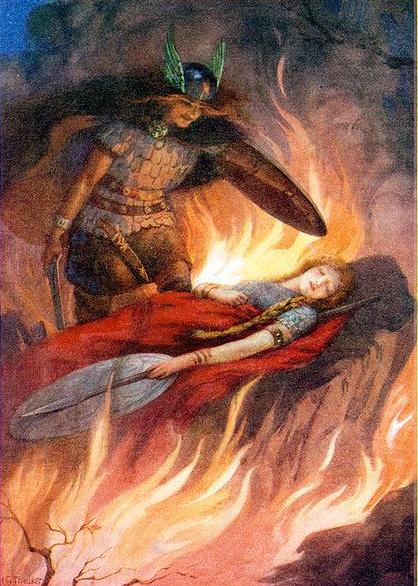
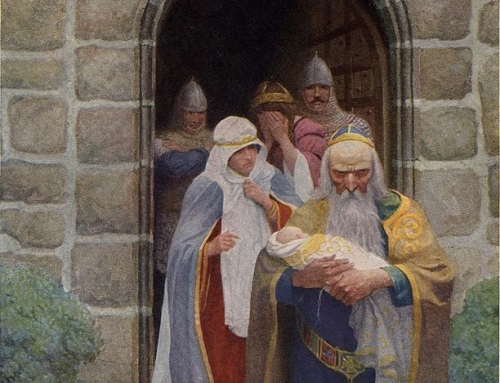
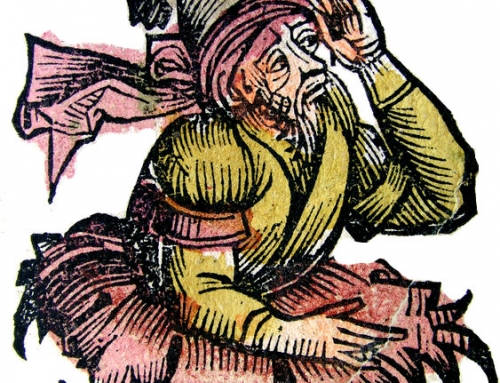

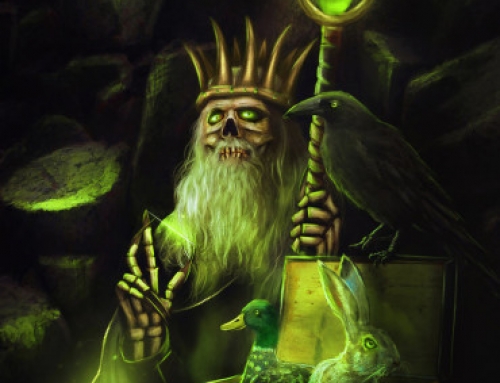
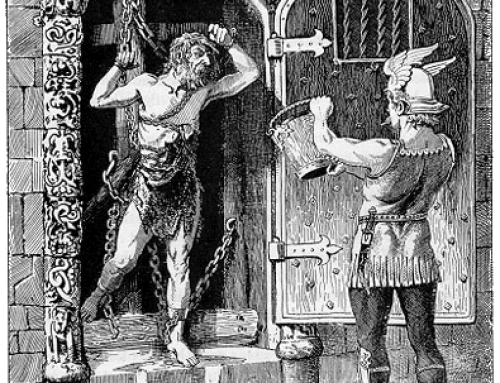
Leave A Comment